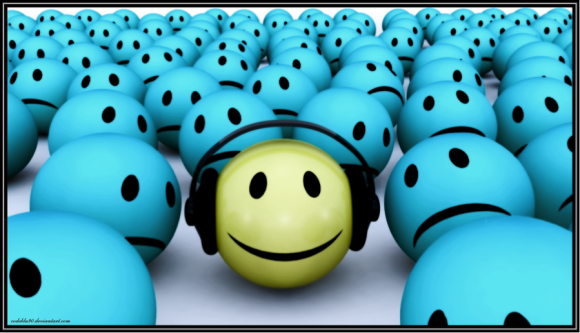The word music is very vague, and honestly gives each person a different thought under the umbrella term of “music.” It might make you think of concerts, or physically playing an instrument, singing, or just your favorite radio station. Music takes many different shapes and form that each requires different levels of action from the person involved. Simply listening to your favorite song requires little to no real concentration on your part.
Over the past four years, I’ve played piano as a personal hobby, been a part of All City Choir (which is a selective group of high school singers from schools all around Philadelphia), and sang in an acapella group. All three of these activities have brought me very different senses of joy. There is a real difference in feeling from when you are creating music from an instrument and when you are solely listening to music, but both evoke good feelings.
There are even significant differences between listening to music on your iPod and being at a concert. In one case, you are alone and not playing an active part in your music, yet most people I’ve asked would say this is what they think of when they are asked if they “like music.” Many people I’ve talked to say that their preferred way of “experiencing” music, they say just listening to their favorite song or playlist. Scientists have found that after just fifteen minutes of listening to music, listeners begin to release dopamine, an endorphin that helps cause happiness.[1] This begins to help us understand why even the effortless act of listening to a special song can evoke chills, tears, or the sudden urge to move your feet!

As I mentioned before, there are various ways a person participates in music. The act of making and creating music stimulates the brain. Time even mentioned it in a recent article:
“When you sing, musical vibrations move through you, altering your physical and emotional landscape. Group singing, for those who have done it, is the most exhilarating and transformative of all. It takes something incredibly intimate, a sound that begins inside you, shares it with a roomful of people and it comes back as something even more thrilling: harmony.”[2]
I can say from personal experiences within both my sixteen people acapella group and being a part of a two hundred person All City Choir that harmonizing is one of the most magical feelings in the world. I hope to join an acapella group here on campus at some point within the next year. Recently, I joined Music Therapy Club, and am really very excited to begin to go on trips where I can watch the effects of music therapy in real life as opposed to just reading about it while doing research. Researchers have even suggested that doctors begin to look at music therapy as a form of medicine for those battling ailments like depression or conditions like ADHD. If it involves the brain, I’m a strong believer that music cannot possibly hurt progress in curing diseases.
Music therapy and music as a way of helping people to become happier is very special to me because I am hoping to either start for or work for a business that uses music to sooth either elderly patients or help develop better learning skills for children with ADD or ADHD. I think that music helps people find a voice who can’t always find the right words and opens doors in the mind that would have had a hard time being opened otherwise. Music helps make connections for kids with math, reading, verbal skills and everyday social skills. Music has always played a special role in my life and I think we as a people just haven’t done enough research regarding it to find out all of its potential.
[1] http://news.discovery.com/human/psychology/music-dopamine-happiness-brain-110110.htm
[2] http://ideas.time.com/2013/08/16/singing-changes-your-brain/

I really enjoyed reading this. As a professional singer for many years, I have experienced chills from singing/listening to music numerous times. I never realized dopamine was released.. I am definitely going to read up on this. Super interesting (:
I’ve always wondered the cause of goosebumps or chills when listening to music and learning that listening to music releases endorphins is interesting. I also love music.